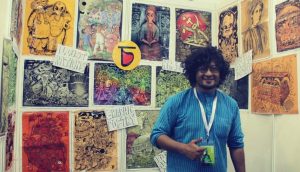In recent days, a new trend is quickly taking over social media: AI-generated Ghibli-style images. Social media has been flooded with Ghibli-style images that make you feel like you’ve stepped into a dream world—soft pastel tones and big, emotive eyes that instantly remind you of Studio Ghibli’s animation style that you have probably seen. Ever since OpenAI launched its new image-generation tool on March 25, users have been eagerly transforming their photos into Ghibli-inspired art with just a few clicks. Your favorite Bollywood movie characters, celebrities, and even your friends transformed into anime-like versions. While many are having fun with the creativity and novelty, this trend has also brought up a debate about its potential to steal from artists and undermine the value of original artwork.
What Are Artists Saying?
Many artists are concerned about how AI-generated Ghibli-style images could diminish the value of traditional, hand-drawn artwork. Charbak Dipta, an illustrator from Kolkata, expressed his frustration, saying that AI-generated art “insults life itself,” quoting Studio Ghibli co-founder Hayao Miyazaki, who has spoken out against AI in creative fields. Dipta and other artists argue that AI cannot capture the emotional depth and personal touch that comes with creating art by hand.


Indrajit Kanungo, a comic artist from Bengaluru, shared a similar view. He believes that the joy of creating something unique is irreplaceable. Kanungo stated that the joy of creating something unique, knowing that no one else can do it the way he did, is a divine feeling. He worries that relying on AI for art could rob future artists of that special connection to their work.
Ghibli-Style Images: Is AI Stealing?
One of the biggest questions surrounding AI-generated Ghibli-style images is whether it constitutes theft. Some believe that AI is copying Ghibli’s style without permission, which they see as stealing. Charbak Dipta argues that posting an AI-generated Ghibli photo is equivalent to committing theft. He feels that making Ghibli’s style freely available and easily replicated reduces the value of the work created by the original artists.
However, others argue that AI is not directly copying the art but adapting it. Prithwiraj Saha, a scholar studying AI, said that unless Ghibli-style images has explicitly stated that it owns the rights to its artistic style, it’s difficult to classify AI-generated art as theft. This raises complex questions about copyright and the ownership of artistic styles.
Despite the backlash from some artists, OpenAI, the company behind the new AI tool, has largely supported the trend. CEO Sam Altman even changed his profile picture to an AI-generated Ghibli-style image, signaling his approval. OpenAI has said its tool follows a “conservative approach” to mimicking artistic styles, specifically avoiding the direct replication of living artists’ work. The company believes that AI can inspire new fan creations, but it is also cautious about how the technology is used.
